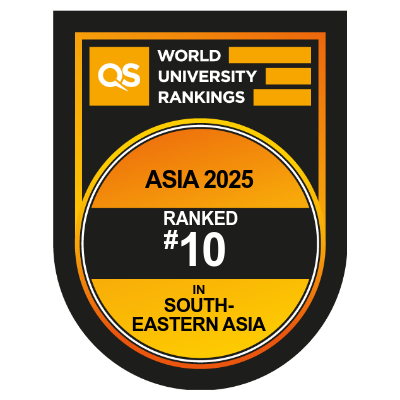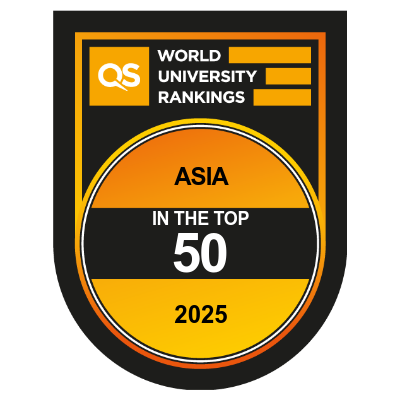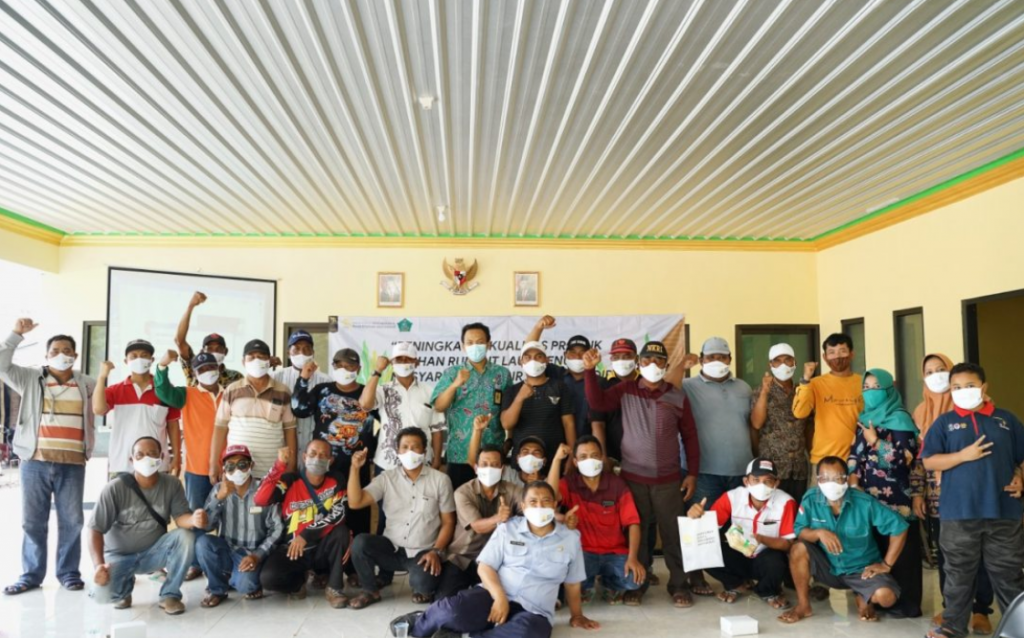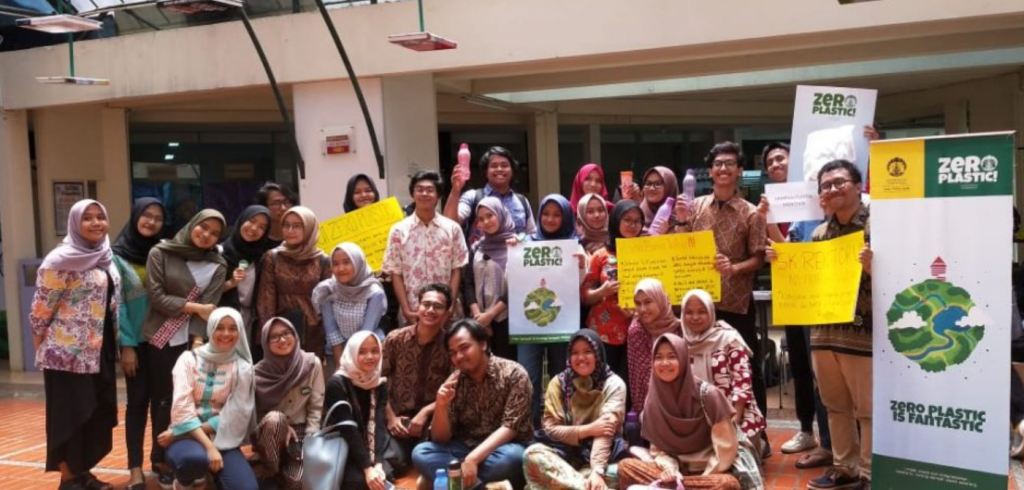The two SDGs that look at the broader ecosystem divide it into Life Below Water, and Life on Land. The oceans, and the rivers and watersheds that link to them, are the largest part of our ecosystem. 40% of the world’s population lives within 100km of the coast, and we all rely – directly or indirectly – on the sea.
THE Impact Rankings Methodology 2022, p. 157
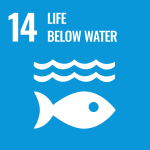
Supporting aquatic ecosystems through education
An educational program on fresh-water ecosystems is provided by Universitas Indonesia through Community Service activities in Jepara Regency, especially Dung Paso Waterfall.
Community education programs related to sustainable fisheries are realized through socialization on tourism awareness and tourism activity training to 100 fishermen in 12 tourist routes in North Jakarta. Another similar activity is the Sidoarjo Bandeng Cultural Center Management Program as the local wisdom of the city. This activity aims to generate participatory change agents in the advancement of coastal tourism. The Community Service Team of UI Vocational Education Program also implemented the Sidoarjo Bandeng Cultural Center Management Program as the local wisdom of the city. The program carried out consists of Milkfish Weighing and Auction Assistance and Milkfish Branding Assistance.
UI Vocational Program promotes Fishermen aware of Tourism in 12 Coastal Paths in North Jakarta
The Community service team of UI Vocational Program initiates Sidoarjo Milkfish as a local signature
Universitas Indonesia together with the Indonesian Torch Pustaka Foundation and the Research Center for the Expertise Board of the House of Representatives of the Republic of Indonesia published a book entitled “Kebijakan Pembangunan Ekonomi Kelautan Indonesia: Quo Vadis? (Indonesia’s Marine Economic Development Policy: Quo Vadis?)“
The analysis results in the form of ideas and thoughts as well as empirical experiences as outlined in the book are expected to be an overview and input in efforts to improve, develop, strengthen and redesign marine economic development policies in Indonesia. The analytical approach is carried out not only based on the field research results that have been carried out but also based on reviews of various related studies and empirical analysis based on previous studies.
Analysis of natural formaldehyde formation on several types of marine fish circulating in Jakarta
POLLUTION INDEX AND ECONOMIC VALUE OF VANNAMEI SHRIMP (Litopenaeus vannamei) FARMING IN INDONESIA
Supporting aquatic ecosystems through action
Universitas Indonesia supports and organizes events to promote the conservation and sustainable use of ocean, sea, lake, river and marine resources. For example, the lecturer of UI Vocational Education Program and the Department of Marine Affairs and Fisheries of Sidoarjo provides education on how to improve the quality of seaweed. In addition, Universitas Indonesia also supports the revitalization of Rawa Besar Lake as a Water Tourist Attraction through seminars.
UI Vocational Program supports the revitalization of Rawa Besar Lake
A national-level marine meeting had been held with the single agenda of compiling a roadmap for the 14th Sustainable Development Goals (SDGs) on life below water. This meeting was attended by marine and fisheries stakeholders from ministries and institutions, business people, academics, and the community to address issues and challenges in the use of natural resources originating from the sea.
Universitas Indonesia has a policy to ensure that food supply on campus coming from aquatic ecosystems is harvested sustainably. This commitment is stated in the UI Rector’s Decree No. 057 of 2017 concerning the implementation of Safety, Occupational Health, and Environment (K3L) of UI canteen. Article 14 of the decree states that the way of handling food and beverages must comply with the provisions, one of which is that all materials processed must be of good quality, fresh, and not rotten. It is in accordance with the Government Regulation No. 28 of 2004 concerning Food Safety, Quality, and Nutrition Article 3 stipulating that the fulfillment of sanitation requirements in all food chain activities is carried out by applying good guidelines including good farming methods, good fresh food production methods, good processed food production methods, good food distribution methods, good food retail sales methods, and good fast-food production.
UI’s commitment to maintain ecosystems and biodiversity is reflected in the development of palm oil derivative products by Islamic Boarding Schools through Small and Medium Enterprises and Cooperatives (UKMK) of oil palm in Riau area carried out by the Oil Palm Plantation Fund Management Agency (BPDPKS) in collaboration with the Sharia Economics and Business Center of Faculty of Economics and Business, Universitas Indonesia (PEBS FEB UI).
2021 Santripreneur Program 2021 of PEBS Faculty of Economics and Business
Lecturers and Researchers from the Department of Biology, FMIPA UI develops an application for disaster mitigation in an area that becomes an innovation in advancing tourism in the midst of pandemic, namely Tanjungjaya Village, Panimbang sub-district, Pandeglang Regency, Banten. Users of this application can easily see what tours are offered.
Basically, applications providing information about conditions and potential disasters already exist as well as several applications from several government agencies. Specifically for tourist areas such as Tanjungjaya, the application contains detailed information related to structural mitigation in the form of evacuation routes and gathering points. In this feature, users will be directed to the nearest evacuation route, travel time and meeting point. This is certainly beneficial in terms of tourism resilience related to disaster mitigation. The advantage of such application is its lightweight packaging and its messenger feature for suggestions and input for the manager.
In addition to the beautiful and comfortable Urban Forest area, there is also a lake functioning as a water catchment area at UI. The aquatic ecosystem in Indonesia is 30 ha.
There are six lakes on UI Depok Campus,
Furthermore, there are UI Campus Love Program (PCK) and UI Zero Plastic.
UI’s urban forest and green open spaces function as facilities for germplasm collection and conservation, as well as a water catchment area for Ciliwung watershed (DAS). In addition, UI also has six lakes, namely Kenanga, Agathis, Mahogany, Puspa, Ulin, and Salam lakes abbreviated as KAMPUS. In addition to supporting water conservation at UI, the lakes originating from Ciliwung river basin also function to restrain the water flow when rainfall and river discharge are high.
The School of Environmental Sciences in 2020 conducted research related to Technologies towards aquatic ecosystem damage prevention (direct work), for example, Analysis of water pollution using the STORET method in the Upper Citarum Watershed.
Water sensitive waste disposal
Universitas Indonesia complies with the Government Regulation No. 82 of 2001 concerning Water Quality Management and Water Pollution Control containing water quality standards in the appendix as water quality standards. UI complies with the Regulation of the Minister of Environment and Forestry of the Republic of Indonesia No. 68/Menlhk/Setjen/Kum.1/8/2016 concerning Domestic Wastewater Quality Standards as guidelines for water disposal.
UI’s Regulation of Water Quality Management and Water Pollution Control
Monitoring and Evaluation of the Environmental Quality of the UI Campus Area
The Implementation of water disposal guidelines and standards is also available at the faculty level. One example is the Faculty of Medicine that has a Recycled Water Treatment Plant. Recycled water is one of the water sources used regularly on the campus of the Faculty of Medicine, Universitas Indonesia, where the quality of the water produced has been tested for use. The Water Treatment Plant used to manage recycled water has a capacity of 30 m3/hour with a water source from the Sewage Treatment Plant with a capacity of 11 m3/hour. The use of recycled water is intended for flushing toilets. The use of recycled water is under planning study to be used for watering plants.
The action plan for reducing plastic waste is implemented at the university level through the UI Rector’s Decree No. 4 of 2019 concerning the Zero Plastic Program. The UI Faculty of Economics and Business also has an action plan related to limiting the use of paper and plastic. The Faculty of Public Health has issued a circular letter regarding the Appeal to Restrict the Use of Plastic and Paper. One example of the action plan at the Faculty of Administrative Sciences is to remind all staff to reduce the use of plastic bottles by using tumblers through posters on staff desks.
Reducing the use of plastic at the Faculty of Economics and Business
Reducing the use of plastic bottles at the Faculty of Administrative Sciences
Universitas Indonesia has a policy to prevent and reduce all types of marine pollution, especially from land-based activities. UI has a Green Campus Policy and Quality Policy to achieve zero pollution including marine pollution. UI is also committed to complying with the Government Regulation No. 19/1999 concerning Control of Marine Pollution and/or Destruction. In addition, there is also the Establishment of the 2020 UI Lestari Campus Development Task Force for campus sustainability development. Efforts to prevent marine pollution are also reflected in two ways of water management at the Faculty of Medicine, namely the use of pipe-based water (PAM) which has been used thoroughly and the implementation of the recycled water utilization program.
Quality Policy of Safety, Occupational Health, and Environment Technical Implementation Unit (K3L)
The Government Regulation No. 19/1999 concerning Control of Marine Pollution and/or Destruction
The Establishment of the 2020 UI Lestari Campus Development Task Force
Maintaining a local ecosystem
Universitas Indonesia has plans for environmental management to minimize biological, chemical, and physical changes to the related aquatic ecosystems. UI intends to manage each environmental change caused by campus activities. The Environmental Management and Monitoring Plan of Universitas Indonesia is an ongoing and forthcoming study in the campus’ existing operational activities to be annually held in compliance with current regulations in Indonesia.
There is a quality policy in the UI’s Management System Guidelines for Occupational and Environmental Health and Safety (K3L), one of which is to identify potential environmental and safety hazards as well as their risks and management to prevent occupational diseases, reduce occurrence level, and minimize environmental pollution, including aquatic ecosystem and compliance to the national regulations and law.
Universitas Indonesia is committed to supervise the aquatic ecosystem health by performing evaluation and monitoring of water quality and ecosystem in campus twice a year. The monitoring process focuses on six lakes in the campus area. It is intended to evaluate the outcome of ongoing activities as a benchmark for sustainable campus environmental management. It includes measuring environmental quality, collecting supporting data, analyzing data, and compiling reports.
Recycled water is one of the water sources regularly used in the campus area of Faculty of Medicine where the water quality has been tested. The Water Treatment Plant used to process recycled water has a capacity of 30 m3/hr, sourced by the Sewage Treatment Plant with the capacity of 11 m3/hr. The recycled water is used to flush toilets. It is currently under review to be used for watering plants.
FKUI has been equipping faucets with pressure sensors. It is an ongoing project carried out by gradually replacing damaged conventional faucets with the ones using automatic pressure sensors.
Universitas Indonesia collaborates with the local community in the efforts to maintain aquatic ecosystems. One example, the Community Service Team of UI Vocational Program collaborates with Sidoarjo Marine Affairs and Fisheries to improve the quality of processed seaweed products for the local community. This educational activity highlights the “Improvement of Processed Seaweed Quality towards Independent Coastal Communities”, therefore, farmers can master entrepreneurial skills to improve their living standards.
UI Vocational Program educates processed seaweed quality improvement in Sidoarjo
In addition, lecturers and researchers in the Biology Department of Faculty of Mathematic and Natural Sciences (FMIPA) of UI have developed application access for tourism purposes in Tanjungjaya Village, Panimbang Subdistrict, Pandeglang-Banten District with the integrated tourism potential between coastal tourism and other economic activities. The users of this application can easily view various tourism offers. For example, the available one in Tanjungjaya is marine tourism for beach and craft activities.
Noverita Dian Takarina: Safe Coastal Travel through Application
The research related to the collaboration for shared aquatic ecosystems held by School of Environmental Studies in 2019 is a Rainwater Harvesting System to fulfil household water demand in coastal areas, reported in the following link.
Profiling the implementation of rainwater harvesting in Bekasi, Indonesia
Furthermore, Universitas Indonesia commits to collaborate with the local community in the efforts to maintain shared aquatic ecosystems. The Community Service Team (Pengmas) of the Faculty of Engineering of Universitas Indonesia (FTUI) led by the FTUI’s Electrical Engineering Lecturer, Prof. Dr. Ir. Riri Fitri Sari, M.Sc., measures seawater quality using UI BlueMetric in three different locations: Carita Beach, Pandeglang, Banten; Ancol Beach, North Jakarta, DKI Jakarta; and Happy Beach, Bekasi, West Java. The measurements for seawater quality criteria are carried out by testing samples in the laboratory, the results of which are converted into simple values using the UI BlueMetric method.
The Faculty of Mathematics and Natural Sciences (FMIPA) of Universitas Indonesia held the UI Peduli Action by planting mangroves in Muara Citarum to overcome abrasion and conserve the Javan Lutung (Trachypithecus auratus) in Bekasi District, West Java. One of the team members and a Biology lecturer at FMIPA UI, Retno Lestari, explained that the team has planted around 200 mangrove seedlings at the mouth of the Citarum River in Pantai Bahagia Village, Muara Gembong.
The Community Service Team of Universitas Indonesia, consisting of academicians from across the UI faculties, held a socialization and education about the danger of plastic waste through training on waste sorting, composting, and making liquid fertilizer. Dr. rer. grout. Noverra M. Nizardo (Lecturer of the Chemistry Department at FMIPA UI) as the team leader explained that this activity also involved academics from the Faculty of Psychology and the School of Environmental Studies (SIL), in collaboration with Kertabumi Recycling Center for funding support from the Directorate of Community Service and Empowerment (DPPM) of UI through the “Science and Technology for the Community” (IbM) scheme.
UI BlueMetric Results: The Alarming Condition of Coastal Area at Muara Citarum, Bekasi
UI BlueMetric Measuring the Quality of Coastal Area Environment at Muara Citarum
UI Bluemetric Measuring the Quality of Coastal Area Environment at Muara Citarum
UI Cross-Faculty Academics Invite Ciliwung Riverside Residents to Manage Plastic Waste
The Watershed (DAS) management strategy at Universitas Indonesia is applied on the faculty level. One of the faculties implemented this strategy is the Faculty of Psychology with a waterway from a river at the University. The water is used to water plants around the campus using a water pump machine.
RELATED NEWS
Select an image for which you want to see the achievement of the SDG indicators

